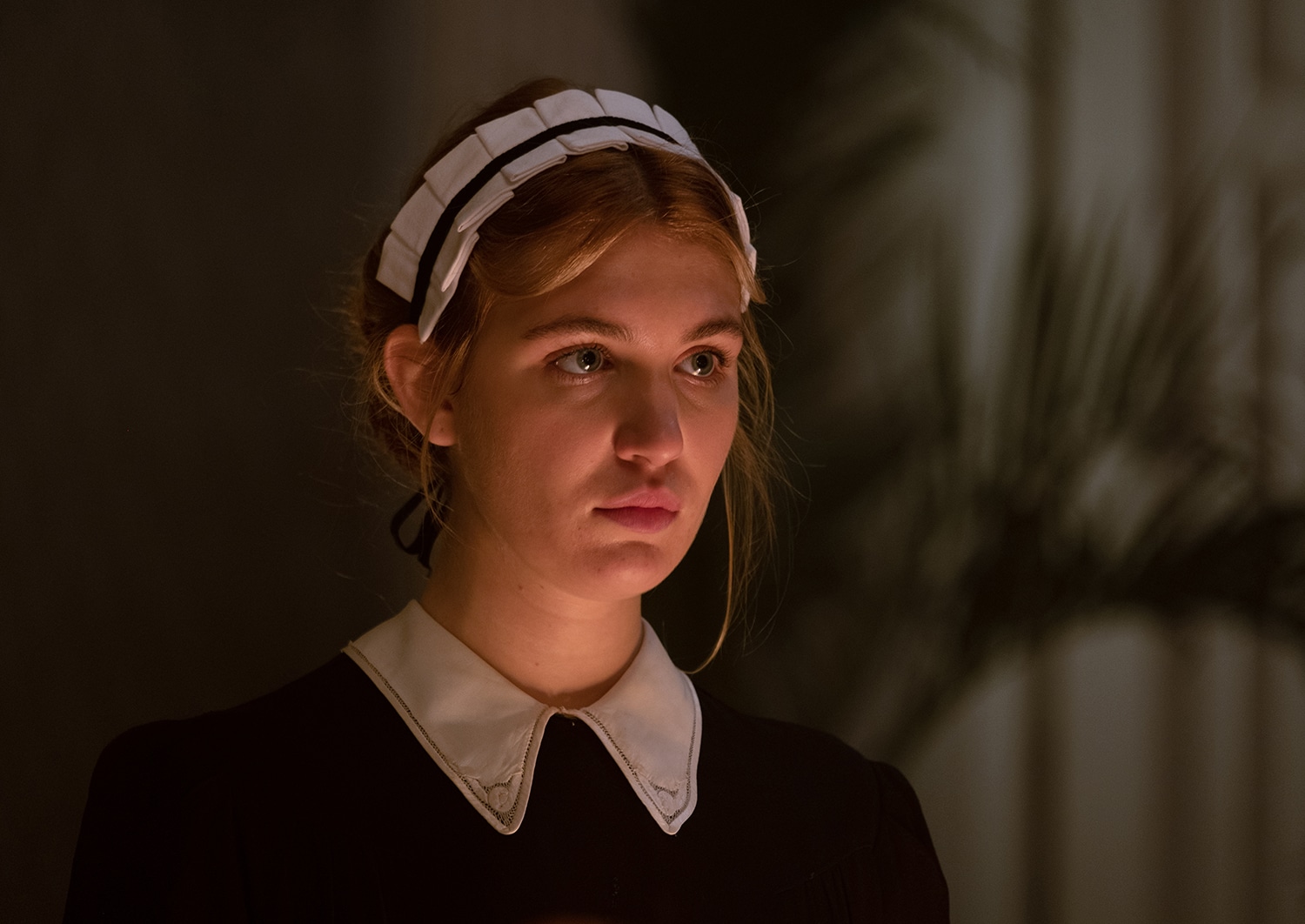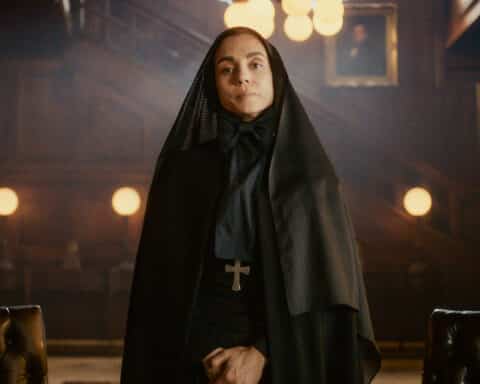Irena Gut checked her watch before rising from bed in the middle of the night. She walked into the bedroom of the Nazi major, who was sound asleep, and paused.
Then, she quietly snuck into his bathroom, where she had hidden a dozen Jews in the wall.
“Take off your shoes,” she whispered as moonlight flooded through the window. They tiptoed past the major who was blissfully unaware of what Irena, his housekeeper, was doing. The cheery music playing from his room disguised the moment that could mean life or death.
So begins one scene from the upcoming movie, “Irena’s Vow,” which brings to life the true story of Irene Gut Opdyke (née Irene Gut), a young Polish Catholic woman who risked everything to hide Jews from the Nazis during World War II. The two-hour film, based on a Broadway play, hits theaters nationwide on April 15 and 16. It follows Gut (Sophie Nélisse), who vows to protect life amid the horrors of war, including the lives of Jews she conceals in a Nazi major’s villa. When the major finds out, she faces a terrifying choice: send them to their deaths or become his mistress.
A daughter’s memory
Gut Opdyke (1922-2003), who later immigrated to the U.S. and became a U.S. citizen, remained silent about her story for years until, one day, she came across a newspaper article that denied the Holocaust. While the film doesn’t include her struggle with the Catholic faith, it retells true events from her life, including her advocacy for an unborn child. It focuses on the message that one person can make a difference.
“It’s so easy to think ‘I’m just one person,'” Jeannie Smith, Gut Opdyke’s daughter, told Our Sunday Visitor.
“Every day we have an opportunity to smile at somebody, to help somebody, to reach out, to befriend someone who’s lonely, stand up for what’s right or stand against what’s wrong,” she said she learned from her mother. “They’re little, small steps, but they make a huge difference.”
In agreement, Nélisse revealed that she read Gut Opdyke’s autobiography — “In My Hands: Memories of a Holocaust Rescuer,” written with Jennifer Armstrong — in preparation for her role as Gut.
“She just inspired me to make little changes in my life that I know can have a greater impact than I ever thought they could,” she told Our Sunday Visitor.
Catholic leaders nationwide are already endorsing the film presented in theaters by Quiver Distribution in partnership with Fathom Events. Bishop David D. Kagan of Bismarck, North Dakota, Father Roger Landry, chaplain at Columbia University, Jenna Guizar, founder of Blessed Is She, and Michael Donaldson, senior director of the Office of Life, Justice and Peace for the Archdiocese of Los Angeles recommend Catholics watch the movie while applauding Gut Opdyke’s bravery.
Each screening will include exclusive video footage featuring Smith, Nélisse; Roman Haller, the baby born as a result of Gut Opdyke’s actions; Dan Gordon, the screenwriter; and Louise Archambault, the director.
Fathom Events notes the numerous honors Gut Opdyke has received for her actions, including the Israel Holocaust Commission’s recognition of her as one of the “Righteous Among the Nations” as a non-Jew who risked her life for Jews during the Holocaust. She also received the Israel Medal of Honor in a ceremony at the Yad Vashem Holocaust memorial in Jerusalem and a special commendation from the Vatican.
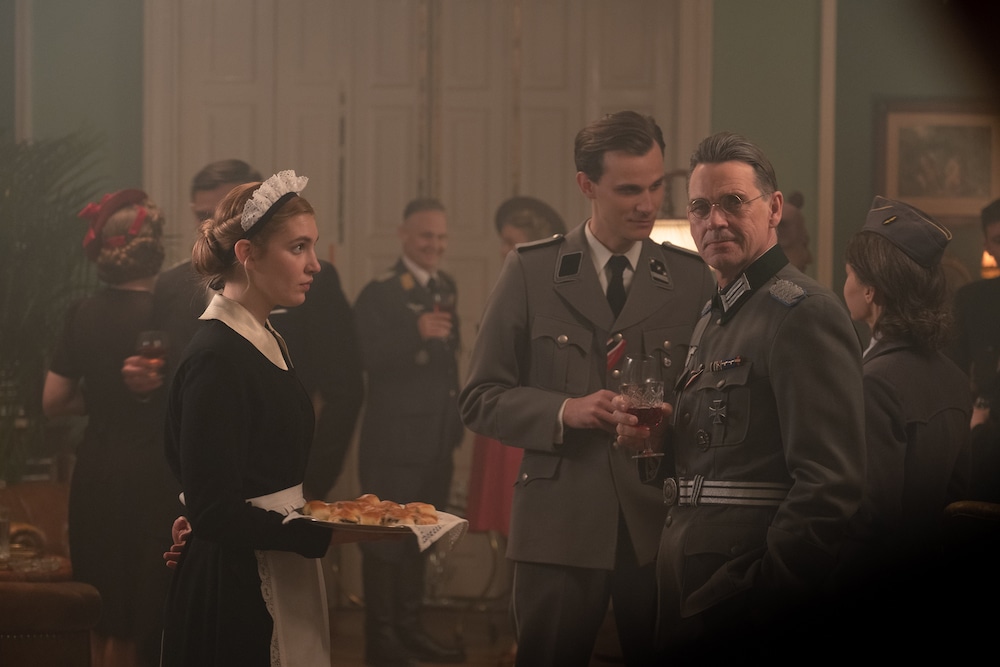
A pro-life message
The entire film sends a pro-life message: Every human person has inherent dignity and worth. One of the more moving scenes comes after one of the Jewish women in hiding finds out she’s pregnant. As a group, they decide they must abort the baby for their own safety.
In the film, Gut Opdyke refuses, mentioning her religion, and then asking the mother how she feels about it.
“We have to live, otherwise the Hitlers of the world have won,” she concludes, adding that she won’t help Hitler destroy another Jewish baby.
The scene draws from real life: In her autobiography, Gut Opdyke writes about this moment.
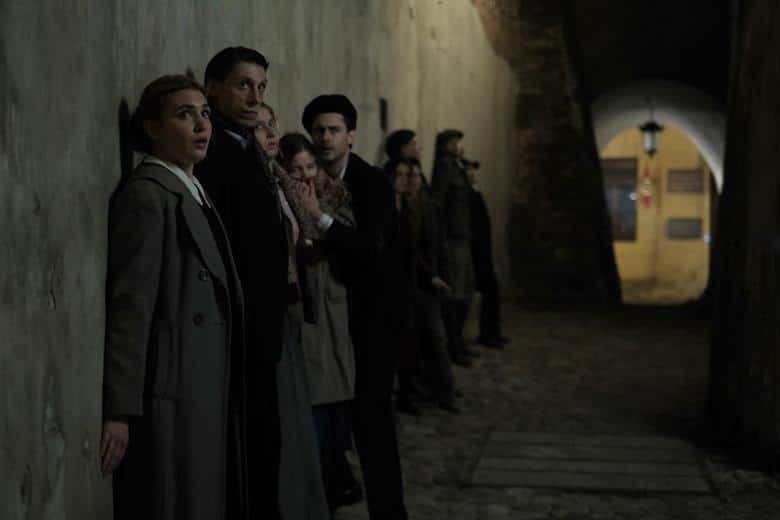
A struggle with the Catholic faith
Smith, a Christian, shared her mother’s struggle and journey in the Catholic faith. She grew up, she said, hearing stories about her mother’s Catholic upbringing.
“Especially at Christmas time, hearing how [Irene’s] father would get the sleigh on Christmas Eve and the family would bundle up and go to church for midnight Mass,” Smith remembered.
She called her mother’s faith “unshakable.” It was a faith, she said, that Gut Opdyke’s family lived. Among other things, her mother’s family embraced an open-home policy where any traveler could stop by for a meal. They also took in and cared for wounded animals.
While she never lost faith in God, Gut Opdyke struggled with her Catholic faith while hiding Jews in the major’s villa, Smith confirmed.
“When she started to be forced to sleep with the major, she was overcome with guilt,” Smith revealed.
Unable to immediately visit a priest she knew, Gut Opdyke went to confession with another priest, Smith said.
“This young priest had a different opinion about helping the Jews and had told her she had to stop what she was doing or she would be no part of the Church,” Smith recalled. “At that point, she just said, ‘I’ve got to go with what I feel God wants me to do.'”
Gut Opdyke writes about this event in her autobiography. In it, the priest tells her it is a mortal sin to become a mistress to save her Jewish friends.
“If you do this, it is your immortal soul that you will lose,” he said, she writes in her book. “They are Jews.”
She responded: “Father, I cannot throw their lives away. Even for my own soul.”
“God had saved my life so many times that I had to believe there was a reason,” she writes. “And I was sure I knew what that reason was: It was to save my friends’ lives.”
In 2003, the Telegraph reported that, due to her disappointment with the Catholic Church’s approach during the war, she married her husband at a Presbyterian church in 1956.
The ethical dilemma of choosing to be a mistress to save lives may be a troubling element of the film for some viewers. Setting aside the unthinkable choices Opdyke faced, her daughter said healing lay ahead for her in the years following the war.
Smith emphasized that her mother later received a special commendation in the ’90s from Pope John Paul II, who was also from Poland.
“It was 100% full circle healing for her,” Smith said.
The Los Angeles Times reported, in 1998, that Opdyke said her encounter with the priest in confession “did not shatter her faith in the church. Though not a devout Catholic, Opdyke said she goes to church on occasion and receives the sacraments.”
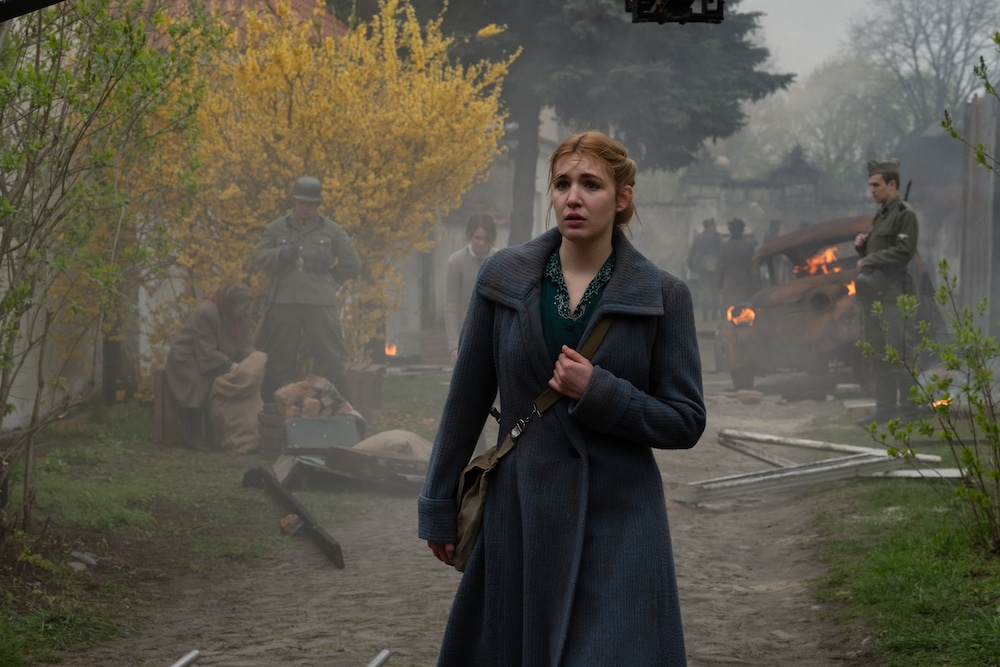
Film takeaways
Starring as Gut, Nélisse shared that, if viewers take away one thing from the movie, she hopes it is an open mind.
“I think in our modern society, we’re so closed off from the rest of the world and focused on our own lives and we lead our lives in a very selfish way,” she said, instead of taking a moment to look around and see those who need help.
“I think we’re so quick to judge other people by their differences and political values and their different religions and I think if we just were more empathetic — and open to at least trying to understand or having a discussion — we’d live in a much more harmonized society,” she added.
Smith concluded with one last piece of wisdom from her mother.
“My mom used to say to kids and to other people that if we think only with our head and not with our heart, our head will tell us, ‘Don’t do it. It’s dangerous,'” she remembered. “So we always have to involve our heart.”
She called it a courageous way to live.
“You wear your heart on your sleeve and you can get hurt and you can get insulted,” she recognized. “But those are small prices to pay for all the things that our honest love for humanity can do. And it’s okay to open up to a little bit of pain because the good far outweighs it.”

